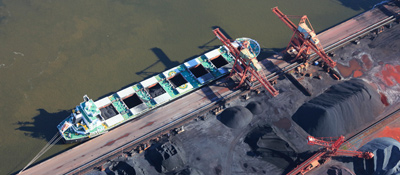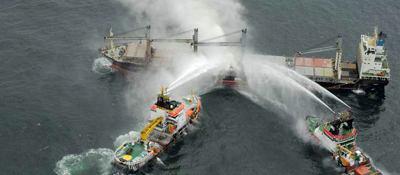Brandstwiete 1
20457 Hamburg

Andreas Herold
Phone: +49 40 36137-258
Fax: +49 40 36137-204
Mail: andreas.herold@bg-verkehr.de
Bulk cargoes (IMSBC)
- Tripartite agreement
- Approval and classification of unknown solid bulk cargoes
- Carriage of ammonium nitrate based fertilizer
- Equipment for the carriage of solid bulk cargoes
- Further information
Manufacturers of unknown solid bulk cargoes must reach an agreement for transportation
The transport volume of solid bulk cargoes by seagoing ships is growing. By now more than one third of the world’s merchant fleet are bulk carriers.
The Maritime Safety Committee of the International Maritime Organization (IMO) has adopted the International Maritime Solid Bulk Cargoes (IMSBC) Code (latest amendment by resolution MSC.500(105)) to facilitate the safe and reliable sea transport of solid bulk cargoes. The IMSBC code has become mandatory on 1 January 2011 by references in the SOLAS convention (chapters VI and VII, part A-1).
Purpose of the IMSBC code is a better control and classification of unknown bulk cargoes lacking any assigned properties or hazard group. For this the manufacturer or shipper of such cargoes must reach an agreement with the relevant flag and port state authorities (so called "tripartite agreement").
Approval and classification of unknown solid bulk cargoes
Bulk cargoes not listed in the IMSBC code to be carried on ships flying the German flag or calling at a German port must be approved by the ship safety division of the BG Verkehr. For that purpose please use the IMO questionnaire.
After verification by the ship safety division the bulk cargo is classified according to its properties and character into one of the following groups:
- Group A: cargoes which may liquefy, if shipped at a moisture content in excess of their transportable moisture limit.
- Group B: cargoes which possess a chemical hazard which could give rise to a dangerous situation on a ship.
- Group C: cargoes which are neither liable to liquefy (Group A) nor to possess chemical hazards (Group B).

Carriage of ammonium nitrate based fertilizer
In May 2015 to the west of the island Helgoland on board the bulk carrier "Purple Beach" which was loaded with fertilizer, a strong smoke production occurred in the area of the cargo holds. By cooling the shell of the ship and flooding the cargo holds with water, it was possible to stop the self-heating of the fertilizer. Two years later, on 12 August 2017, some of the total 42,500 tons of fertilizer containing ammonium nitrate carried on board the bulk carrier "Cheshire" decomposed. The attempts of the crew to control the situation were to no avail. The 24 crew members were rescued. The ship drifted without active control off the Canary Islands until was possible to stop the decomposition process after two and a half weeks. The ship was a total loss.
Because of these two marine casualties, the subcommittee "Carriage of Cargoes and Containers" (CCC) of the International Maritime Organization IMO has published a Circular on the carriage of ammonium nitrate based fertilizer. These types of fertilizer are classified as Group C (non-hazardous), but the two accidents have proven that some fertilizers decompose under unfavourable conditions during the carriage and may consequently release highly toxic gases.
The Circular contains concrete advice how to transport ammonium nitrated based fertilizer (Group C / non-hazardous) and what needs to be done in case of the development of decomposition or a fire.

Equipment for the carriage of solid bulk cargoes
The IMSBC code specifies requirements for the design, construction and equipment of ships carrying solid bulk cargoes. Depending on the properties of the cargo special fire protection and ventilation systems are required on board.
Further information
- MSC.1/Circular of 9. July 2013 (Guidelines for the submission of information of cargoes not listed at the IMSBC Code)
- Amendments to the IMSBC-Code and supplements (Editorial and Technical Group to CCC), 24.03.2016
- latest amendment by resolution MSC.500(105)
- List of national authorities responsible for the safe carriage of grain and solid bulk cargoes

